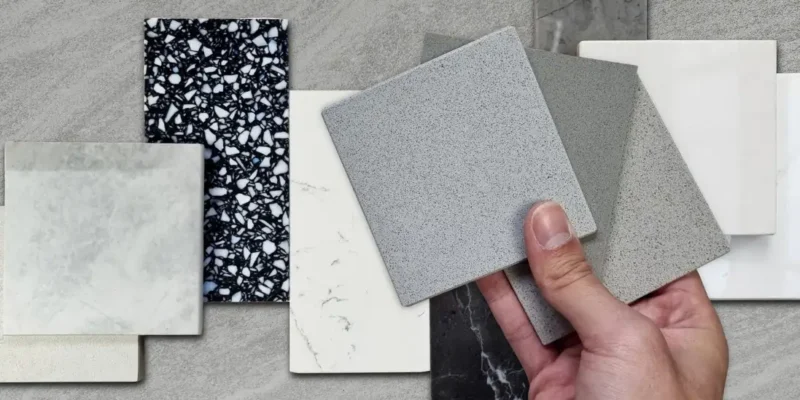When designing or renovating a kitchen in Ontario, your choice of countertop material isn’t just about style-it’s about performance. The province’s unique climate, marked by humid summers and cold, dry winters, means that not all surfaces perform equally well. The battle between natural stone and engineered surfaces is one many homeowners face. Understanding how each responds to Ontario’s environmental conditions can help you make a choice that stands the test of time.
At Teccorp Stone, we work with homeowners across Ontario to find countertop solutions that are both beautiful and built to withstand Canada’s seasonal extremes. In this article, we’ll break down the pros and cons of natural stone and engineered surfaces and help you decide which is better suited for your kitchen.
Understanding the Climate in Ontario
Ontario experiences a wide range of weather conditions:
- Cold Winters: Sub-zero temperatures and dry indoor heating.
- Hot, Humid Summers: High moisture and UV exposure.
- Seasonal Shifts: Frequent temperature swings that can impact building materials.
Materials in your home, especially kitchen countertops, must withstand these changes without warping, cracking, or losing their finish.
What Are Natural Stone Countertops?
Natural stones like granite, marble, and soapstone are quarried from the earth and cut into slabs for use in homes.
Each piece is unique, with its own veining and texture. Natural stone has been a go-to for premium kitchens due to its timeless appeal and durability.
Pros:
- Heat-resistant – Ideal near stoves and ovens.
- Aesthetic variety -Each slab is one-of-a-kind.
- Longevity – When sealed properly, stone can last decades.
Cons:
- Porous surfaces – Require regular sealing (especially marble).
- Higher upfront cost – Natural beauty comes at a price.
- Can crack with improper installation – Particularly in freeze-thaw conditions if not treated right.
What Are Engineered Surfaces?
Engineered surfaces, such as quartz or porcelain, are man-made using a mix of natural stone particles, resins, and pigments. These materials are designed for consistency, durability, and low maintenance.
Pros:
- Non-porous – No sealing required, making them highly hygienic.
- Resistant to stains and scratches – Great for high-traffic kitchens.
- More color options – Uniform patterns and a wider range of hues.
Cons:
- Less natural character – May lack the organic appeal of real stone.
- Heat sensitivity – Resins can be damaged by direct high heat.
- Cost similar to or higher than some natural stones – Especially for high-end engineered quartz.
Performance in Ontario’s Climate
- Moisture Resistance
- Natural Stone: Marble and soapstone can absorb moisture if unsealed, potentially leading to staining.
- Engineered Surfaces: Quartz and porcelain are non-porous, making them ideal in humid areas like kitchens near windows or sinks.
Winner: Engineered surfaces
- Thermal Expansion and Contraction
Ontario’s seasonal shifts can cause materials to expand and contract.
- Natural Stone: Can crack if not installed with proper allowances for movement.
- Engineered Surfaces: Quartz and porcelain are more stable, though not immune to stress.
Winner: Tie, depending on installation quality
- UV Resistance
Sunlight streaming through kitchen windows can cause discoloration.
- Natural Stone: Performs well, especially granite and soapstone.
- Engineered Surfaces: Quartz may fade or yellow over time with prolonged sun exposure.
Winner: Natural stone (especially darker granites and soapstone)
- Durability Against Wear and Tear
- Natural Stone: Scratch-resistant but can chip or etch (especially marble).
- Engineered Surfaces: Highly resistant to scratching and everyday wear.
Winner: Engineered surfaces
Maintenance and Lifespan
Natural Stone
- Needs sealing every 1-2 years.
- Can develop a patina over time.
- Scratches and chips can often be repaired professionally.
Engineered Surfaces
- Virtually maintenance-free.
- Easy to clean with soap and water.
- Long lifespan with little change in appearance.
Low-Maintenance Winner: Engineered surfaces
Long-Term Charm Winner: Natural stone
Aesthetic Flexibility
If you’re designing a modern, minimalist kitchen in a North York condo or a rustic farmhouse kitchen in rural Ontario, your surface choice should align with your style.
- Natural Stone: Ideal for classic, timeless, and natural looks.
- Engineered Quartz/Porcelain: Better suited for contemporary and sleek designs with consistent patterning.
Design Variety: Tie – depends on style preference
Budget Considerations
- Natural Stone: Ranges widely, with granite being more affordable than marble.
- Engineered Surfaces: Quartz and porcelain often have a consistent mid-to-high price tag.
Budget Flexibility: Natural stone (if you choose materials like granite)
What Do Ontario Homeowners Prefer?
At Teccorp Stone, we’ve seen that preferences often come down to lifestyle:
- Busy families love quartz for its durability and ease of cleaning.
- Design-focused homeowners gravitate toward the character of natural stone.
- Rural or suburban homes tend to use more natural finishes.
- Urban condos often lean toward engineered quartz for a streamlined aesthetic.
Final Thoughts
In Ontario’s variable climate, both natural stone and engineered surfaces can be excellent choices-with the right planning and installation. If you want low maintenance and uniform appearance, engineered quartz or porcelain may be the way to go. If you’re after natural charm, longevity, and uniqueness, stone like granite or soapstone won’t disappoint.
Working with professionals like Teccorp Stone ensures your countertops are not only beautiful but also climate-appropriate, expertly installed, and built to last in Canadian homes.


